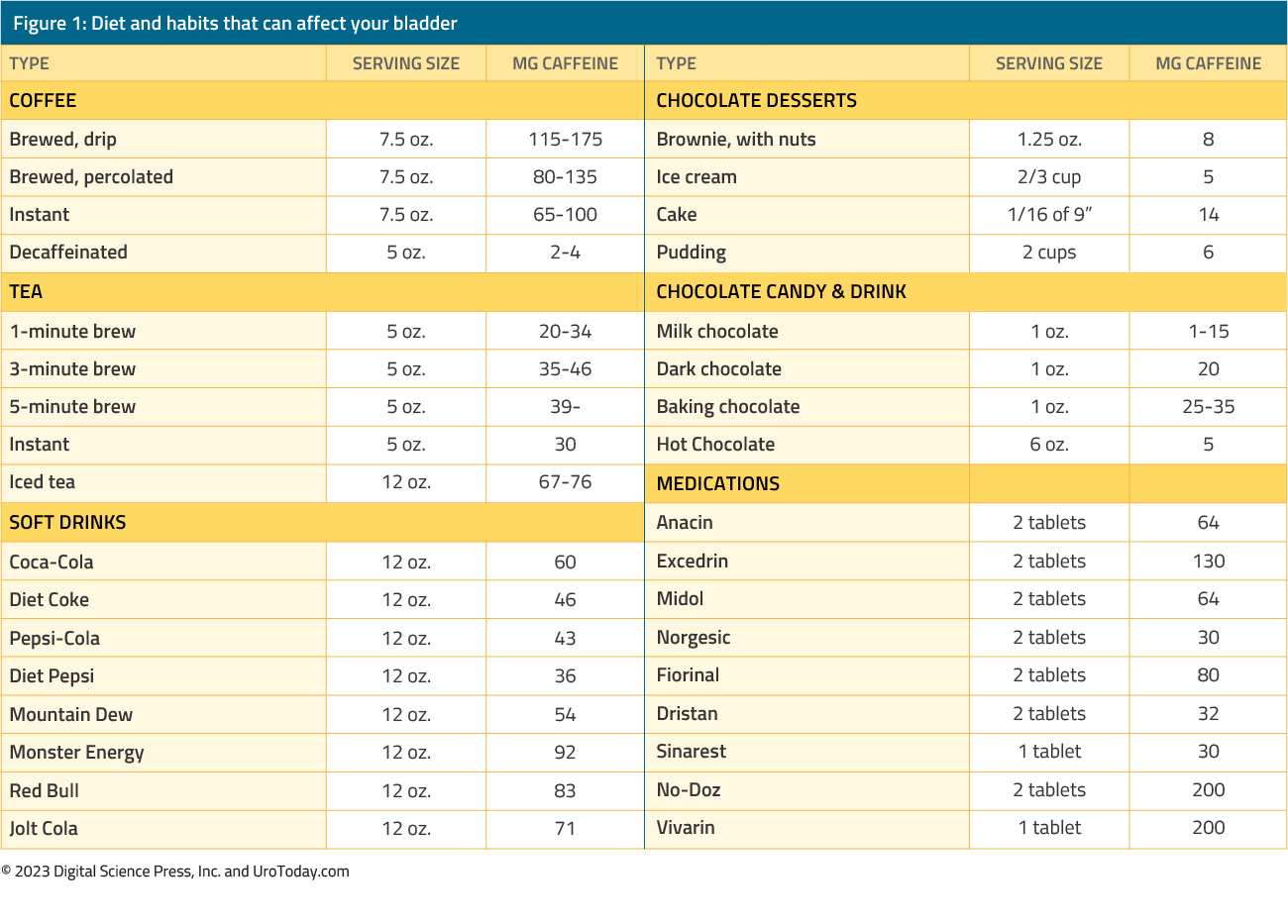Common Bladder Irritants Found in Foods and Drinks
Certain foods, liquids and beverages, medications and even herbs can “trigger” your bladder symptoms. Their effect on the bladder is not always understood and the same food or liquid may affect different people and their bladders in different ways. Check the lists found here to see if any of them are adding to your symptoms. If you find one, stop them for a few days to see if your bladder symptoms improve. Then introduce it back and see if you notice any changes.
Caffeine is a bladder irritant and can cause you go urinate (pee) more often. The effect of caffeine can be seen within 30 minutes. Caffeine is found in chocolate, soft drinks, over-the-counter medications, and is used as a flavoring agent in many baked goods and processed foods. As a rule of thumb, dark chocolate drinks contain the most caffeine because it contains more cocoa solids than milk chocolate. Americans average more than 400 mg of caffeine intake every day. The FDA has listed more than 1000 drugs you can buy off the shelf in pharmacies and drug stores that contain caffeine. Caffeine may not be listed on labels. Here, are the most common caffeine sources.


Fluids and Drinks!
What and how much you drink can lead to bladder control problems (bladder leaks or incontinence). Many people who have bladder problems will drink less, hoping they will pee less often. While drinking less liquid does result in less urine in your bladder, a smaller amount of urine may be more highly concentrated and irritate the lining of your bladder. Concentrated urine (dark yellow, strong smelling) may cause you to pee more often. Also, drinking too little fluids can cause dehydration. So, do not limit your fluids to control your bladder unless your doctor or nurse tells you to.
Too much fluid is can also lead to bladder control problems. Some will increase the amount they drink because they think more urine in the bladder will cause less bladder urgency. But drinking too much fluid will cause you to go to the bathroom more often. So, avoid extremes in the amount you drink (neither too much nor too little). You should “drink to your thirst,” and your urine should be pale yellow. Do not drink large amounts at one time; instead, sip 2 to 3 ounces every 20 to 30 minutes. It is very unlikely that you will need to drink more than 2 quarts (or 8 cups) of total fluids each day.
Water is the best fluid to drink! Grape, cranberry, apple, and cherry juices are thirst quenchers that usually are not irritating to the bladder. Cranberry juice may help control urine odor and make the urine more acidic. Acidic urine may prevent the spread of bacteria.
Can Foods or Medications Affect My Urine?
Some foods, like asparagus, can cause your urine to smell odd. Some medications, like those you may take for bladder pain, may cause your urine to have a strange color or odor. Another cause of foul smelling urine is a bladder infection. So if you notice that your urine has a strong odor and you have not eaten anything that would cause this, report this to your doctor or nurse.
Other Things That May Affect Your Bladder
• Women, more than men, are at risk for getting bladder infections. If you are someone who has frequent infections, do not wear nylon underwear and pantyhose. Cotton underwear is better. Do not use perfumed toilet tissue or sanitary napkins because the dyes and perfumes may be irritating. Also, do not take bubble baths or douche.
• Being overweight may be part of the cause of your bladder leaks (incontinence) and is also a dangerous health problem. Many women and men notice improved bladder control if they lose weight.
• The nicotine found in cigarettes can be irritating to the bladder lining and smoking is a cause of bladder cancer. Coughing from smoking may lead to bladder leaks during coughing spasms.
© 1997 (2020) Diane K Newman PATIENT EDUCATION – CAFFEINE CHART


